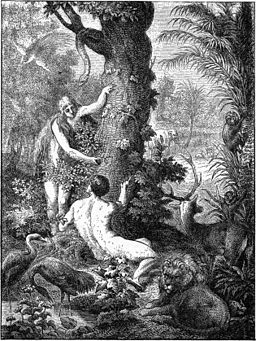
I say naive, not literal, because it turns out that there is an ancient tradition of looking very carefully at each word -- more carefully, I might add, than my fundamentalist elders did -- but without assuming, for example, that the "waters" referred to in Genesis 1:2 are necessarily H2O. St. Augustine argued that this was merely a picture for formless matter, because liquid water does not hold any shape and because the waves are caused by the wind (which is a picture for the Spirit), not the other way around. St. Augustine was neither the first nor the last to reason in this way, but rather than go into details, I will simply refer the interested reader to Saint Augustine on Genesis: Two Books on Genesis Against the Manichees and on the Literal Interpretation of Genesis : An Unfinished Book or, for those who do not wish to buy the book, to this excerpt.
I did not find out about this tradition for a long time, though, and I was left to struggle with the stark contradiction between what I had been taught in my fundamentalist upbringing and palaeontology. Could there be, as had been strongly hinted, some atheistic conspiracy in science to deny the evidence that the world was created only 6000 years ago? I finally concluded that no, this could not be; the science was fundamentally right. As were the Scriptures. If I am not clever enough to understand how they can both be right, that is my problem, not a problem with either science or Scripture.
How, though, could science and Scripture both be true while giving such divergent descriptions of human origins? This led me to consider the different truthful answers that can be given to a young child who asks the question, "Where did I come from?"
Here's one possible answer. "Well, the atoms in your body come from what you eat. What you eat comes from the grocery store. So you come from the grocery store." This is true, but it is not what the child is asking and will not satisfy the child.
Many parents apparently think this is time to give some version of "the birds and the bees" talk, explained in a way suitable for the child's age -- at least enough to explain that the child's hair color comes from her father, and her eye color comes from her mother. This answer is also true, but it is also not what the child is asking.
What the child is really struggling with is a serious philosophical question. "I know that although I am now a living, rational soul, there was a time before I existed. How does that happen?" The child's question is more grown-up, really, than the question that parents usually think the child is asking. The Catholic Church's answer to the child's question is that each soul is a special creation by God, and only God knows exactly how He does this.
Biological evolution answers the question of the origin of our species in the same way that sexual reproduction answers the question of our origin as individuals. Both are true; both are the "scientific" answer; both are answers that seem, at least at first, to be an affront to our dignity. Neither answers the more fundamental and important questions.
No comments:
Post a Comment